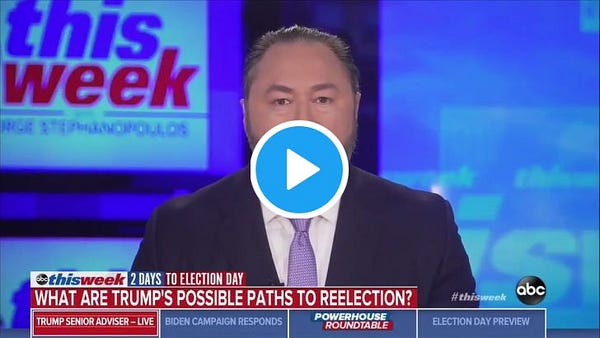Schrödinger's Ballot
In which the language of competition on election night normalizes Trump's attempts to undermine the vote
Every election night, pundits tap their giant magical monitors to zoom and hypothesize and reconfigure the election into blue and red states, districts, even counties, while using terms like “holds a narrow lead there” and “still has a shot over here” and “needs to make a comeback in this state,” as if the counting is the contest. Even careful election analysts like the Nates, Silver and Cohn, are guilty of framing ballot tabulation — which is an accounting exercise — as a competition unfolding in real time. Here’s but one example of what I mean, from Justin Sandefur of the Center for Global Development:
“Even if the 538 forecast for PA proves accurate (Biden +5), given partisan disparities in mail-in voting, Trump could hold a 16 POINT lead by the end of Tue night.” (emphasis mine)
The comment is well-meaning, but this language is incorrect in its description of the relationship between the events of election night and Father Time. The phrase “Trump could hold a 16 point lead by the end of Tuesday night” is simply misleading. Again: the counting is not the contest. Once the deadline to cast a ballot has passed (e.g., 8 PM local time on November 3), then nothing is still happening to affect the election. The event has already occurred. No one “is winning”'; someone “has won.” We just don’t yet know who.
And that we don’t know who won immediately after the votes are cast is only due to our limits in tabulation (which are often due to local regulations, like in PA or WI), not to any contest still being underway. Election night is not a live sporting contest. In the 6th inning of a baseball game, it’s perfectly accurate to say “The Tigers are narrowly ahead of the Twins, but the Tiger bullpen is struggling and the heart of the Minnesota order is coming up. I like Minnesota’s chances.” But that same type of language does not work for a game that has already occurred.
This might seem like pedantic hair-splitting for amateur philosophers (“like, time is just a limit on perception, you know?” “Whoa.”). But in an election where one party is determined to prevent ballots from being counted, normalizing this language of unfolding competiton is dangerous. Here’s why: if the citizenry accepts the framing that “a candidate is in the lead,” then it’s far easier for the candidate to say “well, if we stopped the contest now, I’m the winner, right?”
Just look at what Trump toady Jason Miller said today. (If you struggle to keep up with Trump toadies: Jason Miller is the Trump toady who impregnated his mistress and then gave her a doctored smoothie to induce an abortion. Don’t confuse him with Stephen Miller, the Trump toady who promotes white nationalism).


How sly. This whole argument hinges on his listeners — the interviewer Stephanopoulos, or better yet, the public — agreeing that the tally marks that count the votes are the votes, and that, therefore, continuing to count votes is akin to voting late.
Trump himself is erratically promoting this plainly undemocratic approach. Just this evening he said to reporters that he thinks it’s terrible if results won’t be known immediately, and that he’s planning to use his attorneys to attempt to stop the counting before the (presumably Biden-friendly) absentee votes can be tallied. (I honestly do not get why so many Republicans claim to favor a narrow, strict interpretation of the US Constitition while abiding this kind of utterly non-Constitutional drivel from this man. If any Trumpists out there can explain it, let me know.)


It’s horrible, but it’s partly our fault. We all fall for the competition metaphors. The antidote is for us citizens to be OK with a boring, accounting-based election night. Don’t get sidetracked by the Superbowl-style graphics and the “comeback” and “big lead” language. Remember that we’re watching the counting, the settling up after the contest, not the contest. It might take a while. That’s OK. Counting every vote is critical.
Resist the urge to turn the sober business of vote counting into a game show — especially when that’s what the game show character who became president wants you to do.
Two days, friends. Two.

Image source: wikimedia commons. https://commons.wikimedia.org/wiki/File:Cat_March_2010-1.jpg


